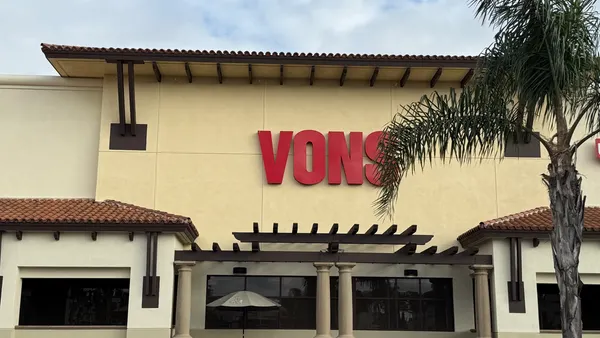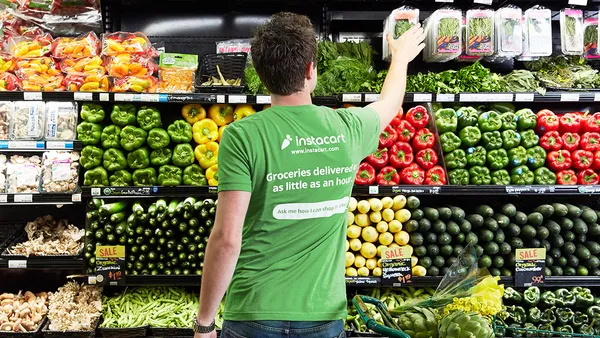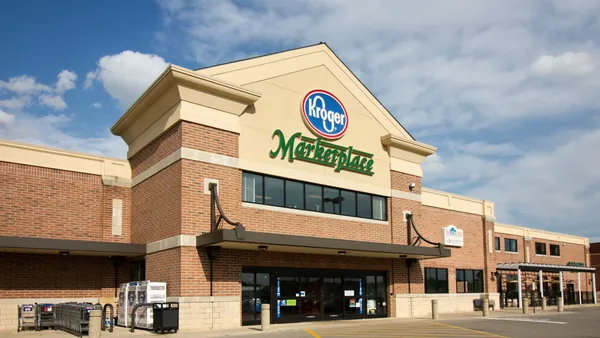Dive Brief:
- Supermarkets need to stop lowering their prices to compete with hard discounters Aldi and Lidl because price is a battle supermarkets can’t win, said Bill Bishop of Brick Meets Click in a press release shared with Grocery Dive.
-
Rather than eroding profit margins, supermarkets should instead leverage their weekly specials, which often beat Aldi and Lidl’s pricing, and focus on products customers care about that retailers can personalize through loyalty programs and customer data.
- Price data from Circular Logic found that supermarkets’ weekly advertised prices are frequently lower than Aldi and Lidl’s everyday prices. During one week last month, a grocer in the Southeast had the price advantage for 8 out of 11 of its front-page features based on comparable or same items.
Dive Insight:
Aldi’s reported expansion and Lidl’s entrance in the U.S. have had grocery retailers on high alert over the past two years, and the continued pressure has driven many to try to compete on price as they attempt to keep pace.
According to Bishop with Brick Meets Click, price competition is a losing proposition. With the ability to charge prices 30% to 40% below supermarket prices, hard discounters make it nearly impossible for other grocers to compete on cost. Supermarket operators will be better off if they combine the power of their customer data and shopper loyalty with their weekly circulars, which gives them the opportunity to win with each individual shopper — a more effective goal and a profitable strategy, Bishop said.
Data collected by Circular Logic (below) shows prices at a Southeast grocer during one week in February were well above Aldi and Lidl in categories ranging from produce to steak. But promotional pricing beat the discounters in these same categories 72% of the time, reinforcing the importance of targeting price drops effectively.
Aldi embarked on a major U.S. expansion and remodeling campaign back in 2017 and is well on its way to reaching 2,500 stores by 2022. The grocer is aiming to be the third largest U.S. grocery retailer behind Kroger and Walmart. Meanwhile, Lidl’s start-and-stop launch in the U.S. seems to have finally steadied. The company acquired 27 Best Market stores in the Northeast late last year, recently moved into the Washington, D.C. and Atlanta markets, and plans to open at least six stores in Philadelphia.
All of this activity has spurred grocery retailers of all sizes to slash prices, invest in private labels and try to outmaneuver the German discounters. Some are responding in fear while others are welcoming the competition. Walmart CEO Greg Foran said recently that the company got "fired up" on news of Lidl’s East Coast expansion, which drove Walmart to remodel some of its stores, lower prices and build up its online business.
Grocers in the Mid-Atlantic have been particularly hard hit as Aldi and Lidl have focused on markets in the region such as Charlotte, North Carolina. Harris Teeter and Publix have lost market share in Charlotte — and both grocers have reportedly added unique features and upscale amenities to differentiate themselves from the discounters.
Kroger has also been more exposed than others to Aldi and Lidl’s competitive threat in markets around North Carolina as well as Atlanta, Georgia, the greater Chicago metro area and parts of Texas. According to a 2018 Wolfe Research report, 50% of Kroger stores in the grocer's core states have an Aldi within three miles.
Aldi and Lidl are rapidly winning customers from these traditional supermarket brands. A recent report from Bain & Co found that both discounters have captured 3% or more of grocery spending in several markets, and that as many as 30% of shoppers at mass and traditional grocery stores also regularly shop at Lidl and Aldi.
While that is cause for concern from supermarket operators, it also presents an opportunity for them to offer something different for that segment of shoppers. If customers are going to Aldi or Lidl for the low prices, they may be seeking something else from their traditional supermarket — whether that’s customer service, a specific brand or product they like, or a specialty assortment they can’t find at a hard discounter.











